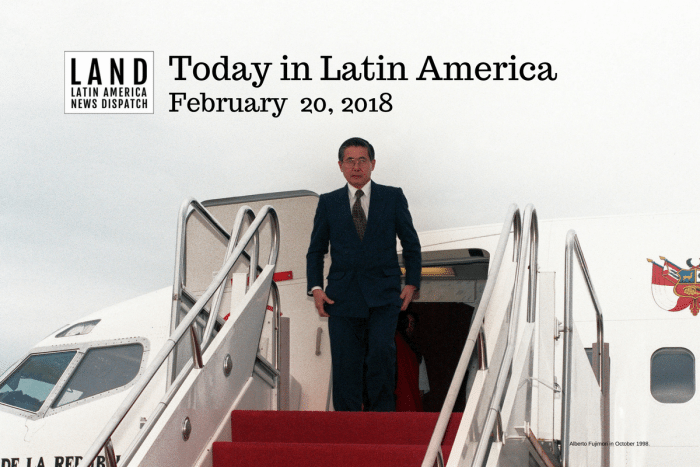

Former Peruvian president Alberto Fujimori could be tried again, a court decided on Monday. This news comes after current President Pedro Pablo Kuczynski granted him on December 24 a “humanitarian pardon” for medical reasons that cut short his 25-year prison sentence for five convictions, including one for his knowledge of the existence of public-funded death squads that murdered civilians. The new ruling determined Fujimori could still stand trial again in connection with a massacre perpetrated by a paramilitary group where six people died in the town of Pativilca in 1992, back when Fujimori was in power. A spokeswoman for the government’s judicial authority said that Fujimori could appeal this new court’s ruling.
Kuczynski’s decision to grant pardon in late 2017 was met with street protests in the country’s capital, Lima, and drew condemnation from human rights groups who saw the decision as a political move on the part of Kuczynski to avoid impeachment for lying about his links to Odebrecht, the Brazilian construction firm at the heart of corruption scandals that are sweeping all through Latin America.
HEADLINES FROM THE WESTERN HEMISPHERE
NORTH AMERICA
Two Mexican federal agents who went missing February 5 were found dead in Xalisco, a town in the state of Nayarit, the country’s federal Attorney General’s Office confirmed late on Sunday night. A video had been distributed last week that appeared to show the two agents surrounded by five unknown gunmen torturing them to force them to confess supposed human rights violations. Nayarit is the territory of Mexico’s fastest-growing criminal organization, the Jalisco New Generation Cartel. The officers worked for the Criminal Investigation Agency.
One of the most important underwater archaeological sites in the world could be in danger due to pollution, experts warned on Monday. The Sac Actun cave system, located in the Mexican Riviera Maya, contains extinct animal remains and some of the oldest human remains in the continent, but high acidity levels pose a threat to the submerged treasure, as urbanization from nearby beach-resort Tulum closes in.
THE CARIBBEAN
After rejecting an initial $1 billion loan request, a federal judge approved a $300 million loan for Puerto Rico’s Electric Power Authority (PREPA), following a revised appeal submitted last Friday. However, Gov. Ricardo Rosselló maintained that PREPA still needs a $1 billion loan to maintain operations in the next few months. PREPA is expected to be privatized in the next 18 months
Oxfam released a report, stating that three of the aid workers “physically threatened witnesses” during the 2011 investigation in Haiti. The 11-page document revealed that a top official admitted paying for sex during the earthquake relief efforts. Simon Ticehurst, Oxfam regional director for Latin America, met and apologized to Haitian minister Aviol Fleurant yesterday, and said they were committed to re-establishing trust and partnership with Haiti, given Oxfam’s 40-year history working with the island and its citizens.
CENTRAL AMERICA
This Wednesday, five Central American nations will sign a trade deal with South Korea. El Salvador, Honduras, Nicaragua, Costa Rica and Panama will send their economy ministers to Seoul to consolidate negotiations that started in June 2015. During 2016, these five Central American nations imported $1.08 billion from South Korea and exported $143 million to the country.
NORTHERN ANDES
Venezuela will hold pre-sales of the new “petro” cryptocurrency Tuesday, as the cash-strapped government of Nicolás Maduro struggles to manage a collapsing economy, amid heavy U.S. and E.U. financial sanctions. While the United States has tried to discourage investment by threatening possible legal action, Venezuelan officials say they expect the crypto-coin, which will be backed by oil, natural gas, and other commodity reserves, to attract international interest from the Middle East, Russia, and China.
Territorial disputes between leftist ELN guerrillas and various paramilitary and narco-trafficking groups have displaced almost 1,400 people, many of them indigenous, in one northwestern Colombian municipality, local officials reported Monday. Of those, 822 were displaced in the past month alone, according to the United Nations. Since the demobilization of the Marxist FARC guerrillas last year, Colombia, which has the world’s second largest internally displaced population, has experienced a wave of violence in areas previously controlled by the rebels.
SOUTHERN CONE
After months of behind-the-scenes negotiations with lawmakers and public reassurances to investors, the administration of Brazilian President Michel Temer admitted Monday that a major pension overhaul is not likely to pass in Congress before October’s general elections. The Senate president, a Temer ally, explained that the proposed constitutional amendment, which would raise the age of retirement and reduce benefits, could not be taken up while the military remains in charge of security in Rio de Janeiro state. But the government minister tasked with shepherding the unpopular bill through Congress acknowledged that it lacked the necessary votes to pass.
NEW IN LAND
Finally, we invite our TILA subscribers to read our kickoff feature for Latin America News Dispatch 2018! A dive into Mexican author Juan Rulfo, who would have turned 100 this 2017.


